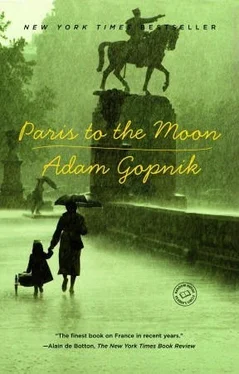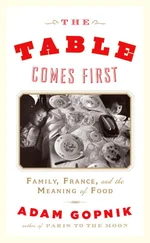Among men, an enthusiasm for sport simply segregates you in a separate universe: You are a sportsman or you are not. The idea of sports as a lingua franca meant to pick up the slack in male conversations is completely alien here. The awkwardnesses that in America can be bridged by a hearty “See the Knicks last night?” exist here, but nobody bridges them by talking about sports. Sport is a hobby and has clinging to it any hobby’s slightly disreputable air of pathos. Also, sport is an immigrant preoccupation: Whereas in America it acts as a common church, here it is still low church. There is a daily sports paper here, titled L’Equipe, but it is meant for enthusiasts; Le Monde devotes one or two pages to the subject, and Liberation only a few pages more. Paris has one good soccer team (whereas London alone has six), but you could walk the length and breadth of Saint-Germain and not see a single bit of evidence—not a sign in a window, a pennant in a bar, or a sweater on a supporter—that it exists. France has some terrific footballers, but they play mostly in England and Italy. The nearest thing to a Magic-Michael showdown in France is the affrontements of the French-born players David Ginola and Eric Cantona, but those take place across the Channel, in the North of England, where Ginola plays for Newcastle and Cantona for Manchester United. Still, Ginola and Cantona are regularly dunned by L’Equipe to declare their love of country. “But la France I think of all the time! Not only when I play Manchester! She is in my head and in my heart!” Ginola declared recently. It sounded a little forced to me, but apparently L’Equipe was satisfied. Legend has it that among Frenchmen sex and food are supposed to take the place of sports (“Did you perhaps see the petite blonde with the immense balcon, mon vieux ?”), but in fact they don’t. What the French do to bridge the uneasy competitive silences that seem to be the price of a Y chromosome is talk about government and particularly about the incompetence of government ministers; which minister has outdone the others in self-important pomposity is viewed as a competitive event. Though the subject is different, the tone is almost exactly the same as that of American sports talk. “Did you see Leotard on the eight o’clock last night?” one Parisian man might ask another. (The news is on at eight here.) Then they both shake their heads woefully, with that half smile, half smirk that New York men reserve for Mets relief pitchers: beyond pathetic .
If talking about the bureaucracy takes the place of talking about sports, getting involved with the bureaucracy takes the place of exercise. Every French man and woman is engaged in a constant entanglement with one ministry or another, and I have come to realize that these entanglements are what take the place of going to a gym where people actually work out. Three or four days a week you’re given something to do that is time-consuming, takes you out of yourself, is mildly painful, forces you into close proximity with strangers, and ends, usually, with a surprising rush of exhilaration: “Hey, I did it.” Every French ministry is, like a Nautilus machine, thoughtfully designed to provide maximum possible resistance to your efforts, only to give way just at the moment of total mental failure. Parisians emerge from the government buildings on the Ile de la Cite feeling just the way New Yorkers do after a good workout: aching and exhausted but on top of the world.
A few days after my oral interview I went back to the Regiment Rouge, and this time I actually got on one of the stationary bicycles and rode it for twenty-four minutes. I was in full New York regalia (sweatpants, headband, Walkman) and did it in good New York form (Stones blasting in my headphones, crying out, “One minute!” when there was a minute left to go). By now there were other people at the gym, though the man on the bicycle next to me was going at a speed barely fast enough to sustain life, while the woman beside him, who was on a treadmill, was walking at the right speed for window-shopping on the boulevard Saint-Germain on an especially sunny day when your heart is filled with love and your pockets are filled with money; it was as though she had set the machine at “Saunter.”
I got down from my bike perspiring right through my T-shirt—the first person on the Left Bank, I thought proudly, to break a sweat at a gym. I walked back to the desk. “A towel, please,” I panted (in French, of course). The girl in the red tracksuit at the desk gave me a long, steady, opaque look. I thought that maybe I had got the word for towel wrong (I hadn’t, though), and after I asked again and got the same look in return, I thought it wise to try to describe its function. My description sounded like a definition from Dr. Johnson’s dictionary: that thing which is used in the process of removing water from the surfaces of your body in the moments after its immersion. “Ah,” she said. “Of course. A towel. We have none yet.” She looked off into the middle distance. “This,” she said at last, “is envisaged.” I looked at her dumbly, pleadingly, the reality dawning on me. Then I walked all the way home, moist as a chocolate mousse.
A couple of days later I went for what I thought would be my last visit to the Prefecture de Police to get my carte de sejour, a process that had involved a four-ministry workout stretching over three months. The functionary seemed ready to give it to me—she was actually holding it out across the desk—but then she suddenly took one last look at the dossier the prefecture had on me and noticed something that she had somehow missed before.
“Alors, monsieur,” she said, “you have not yet had a physical examination to make sure that you are in sufficiently good health to remain in France.”
I didn’t know what to say. “I belong to a gym,” I said at last, and I showed her my card from the regiment.
“Well,” she said, “this will be useful for your dossier.” I couldn’t argue with that.
It was a very cold winter here, and it felt even colder. “It’s the dampness,” every shivering Parisian explained. But really it was something else. A visitor who has walked bareheaded and oblivious through twenty arctic Canadian winters found that, out for a walk in Paris with the temperature in the high thirties, he was pulling a woolen hat over his ears and huddling in doorways and stopping in cafés to drink hot wine and then quickly heading home.
What has made it seem so cold is the French gift for social dramatization: A cold day is a cold day, and everyone conspires to give it presence. Looking cold is also a way of making it plain that you are feeling miserable, a way to dramatize the “economic horror” that has overtaken Paris. In the chill a series of smaller social pageants have been played out, including a hostage taking, a craze for a strange book on economics, a growing conviction that the way out of the crisis is for everyone to stop working, a campaign against immigrants that led to mass civil disobedience by intellectuals, and visits by two foreigners bringing messages of deliverance.
The hostage taking at the Credit Foncier de France, a semi-public, or state-supported, mortgage lender, was the first and the most improbable of the economic dramas. The Credit Foncier was practically bankrupt, and the government decided to fob off parts of it on anybody who wanted bits of a failing bank. Its employees then decided that the best way to persuade the government to reconsider this plan was to go to the top and kidnap the president, a M. Jerome Meyssonier. Not only did M. Meyssonier stay on as a hostage, but he supposedly made it the only condition of his imprisonment that no photographer be allowed to take a picture of him sleeping on a cot in his office. The employees agreed, and even decided to keep the bank open for business while the boss was being held incommunicado. Then they too decided to sleep in the building, presumably as an act of solidarity with the boss they had just imprisoned.
Читать дальше












